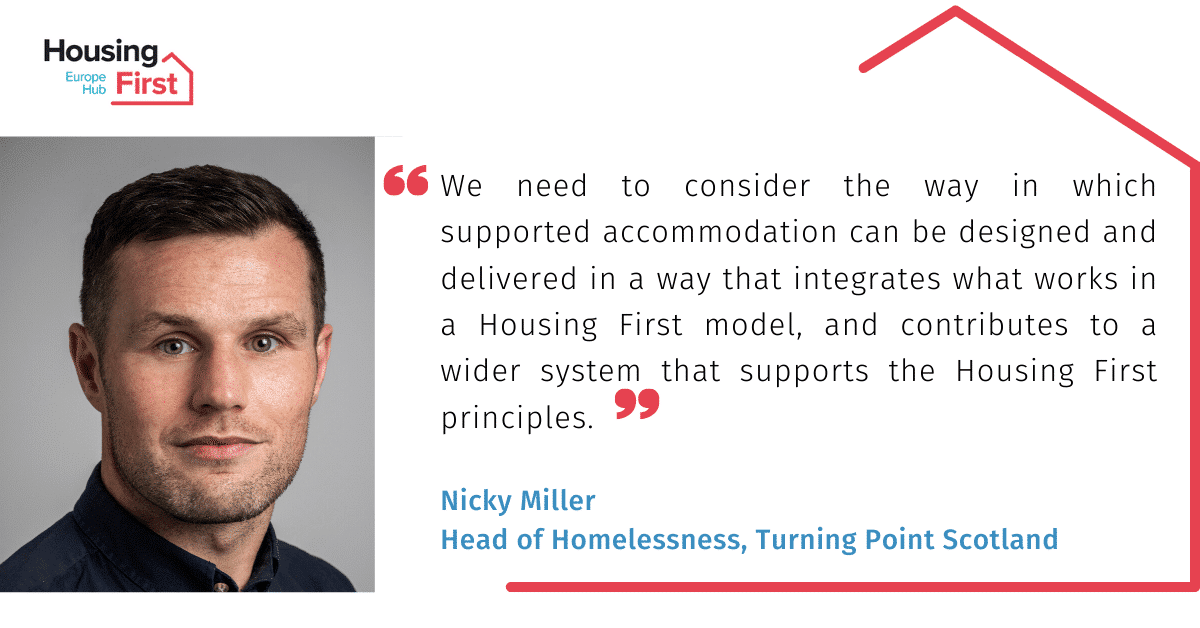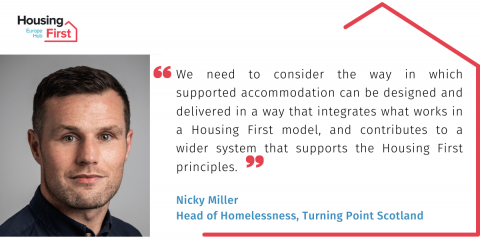
After 10 years of Housing First in Scotland and the UK, we felt that this was the right time to celebrate our success, share what has gone well and what hasn’t gone so well. We had planned an actual event but Covid 19 brought us the scary task of organising our first ever digital l conference, which we delivered successfully in January 2020 ‘The Good, The Bad and the Non-Negotiables’ (For any sessions you missed you can watch them here).
At this event, we launched our latest Housing First video. The video identifies how people engage in the support of Housing First; it shows that people may need support for a long time (maybe forever?) and that the support process is not linear.
We have worked to build Housing First services across six local authority areas. There is much that we have learned over this time, and we continue to learn. As we do so, we want to share those lessons with you, to support the development and growth of this approach across Scotland. There are barriers that held us back at the start, that still remain, 10 years later, so we also want to share our views on what the priorities for the next 10 years should be.
- The Non-Negotiables
As we have learned and developed with the Housing First approach over the last decade, we have come to understand the elements that must be in place if this approach is to deliver the impact that evidence tells us it can. We’ve come to think of these as the ‘non-negotiables’, and they have been supported by a paper completed by Homeless Link (Homeless Link, 2020). The first is so fundamental that it overarches them all: a Housing First service must remain faithful to the key principles of the Housing First model. Other elements include:
– Support is not time limited
– Stability of tenure
– Access to a home is not conditional
– Caseloads should remain low
– Serving people experiencing multiple challenges and ensuring support needs. - Systems fidelity
It is not enough for a Housing First service to operate to the principles of Housing First, we must also consider how the wider social care system in which this model operates supports – or hinders – delivery of these principles. This should include delivering systems fidelity within Housing First. - Measuring Success
We need to start by considering the people supported by Housing First; what does success look like for them? How does success for them as individuals contribute to success for the service commissioner? And beyond that, for the community, the local authority area, and for the country? We must also acknowledge the outcomes delivered for wider parts of the health and social care system – in relation to criminal justice outcomes such as, public safety, reducing reoffending, and to mental health outcomes for example. What data are we all collecting? - Empower stakeholders within Communities of Practice
As we continue to embed this model in Scotland, as the context in which we work shifts and develops, and as we grow in our ambition for what this model and its principles can deliver, we need to learn from and support each other to find the way forward together. This should be done by creating a community of citizens through Communities of Practice sessions. - Invest, support and develop the staff team
‘Stickability’ – the knowledge that staff are going to stay with you through ups and downs – is a key element of an effective Housing First service. Ensuring this demands a lot from our staff team. We need to invest in colleagues, physically and emotionally and support staff’s use of mental health professionals for their own learning as well as unpacking how they feel working with individuals. - Peer Support and Lived Experience matters
Whilst research to date has not identified any better outcomes for Housing First services who use Peer Support Practitioners (PSP), we do not believe that to be the case. We are currently completing a review of our PSP roles which is expected to be released in the coming months. One PSP who was previously supported by a TPS housing first service stated; “Being supported as a service user, when I was introduced to a peer support practitioner, I related to the peers more than anyone else as they have been through the same chaos as me. They gave me something different, enthusiasm. …. gave (Me) hope …. for future … My peer support practitioner was special to me.” - Who decides when we’re done?
How, when and why people move on will vary. We need to balance the principle of long term, open ended support, with the expectations of the system. Another gap in the story told by the data is how, when and why a person’s engagement with Housing First ‘ends’. Again, the number of people ‘moving on’ from the service might be a key measure of success for a homelessness service, but what are we expecting people to move on to? Not all people move on because their life is perfect, is it the systems choice or the individuals when they move on? - Invest in our communities
People are much more able to prevent homelessness or move on from their experience of homelessness if they feel connected to their community. People are in a much stronger position to make progress in their recovery from problematic alcohol and drug use if they have a sense of purpose and value. We need to move upstream and invest in communities to prevent homelessness happening in the first place. - Housing First is not for everyone
We recognise that Housing First is not the right option for everyone, and that our homelessness system must include alternative options that will deliver the same quality of support. We need to consider the way in which supported accommodation can be designed and delivered in a way that integrates what works in a Housing First model, and contributes to a wider system that supports the Housing First principles.
We have written a larger paper focussing on these 9 key messages, which you can read in full here.
Are we ready to talk about some of the upcoming challenges in Housing First?
- Support may be forever
- Services going to people
- Increased pressure on Homelessness budgets (Moving away from silo’d funding)
- Implementing a systems fidelity approach
We are!
Nicky Miller
About the Author:
Nicky Miller is Head of Homelessness at Turning Point Scotland.
Follow Nicky on social media:
Twitter: @NickyMillerTPS
LinkedIn: Nicky Miller – Head of Homelessness, Turning Point Scotland
